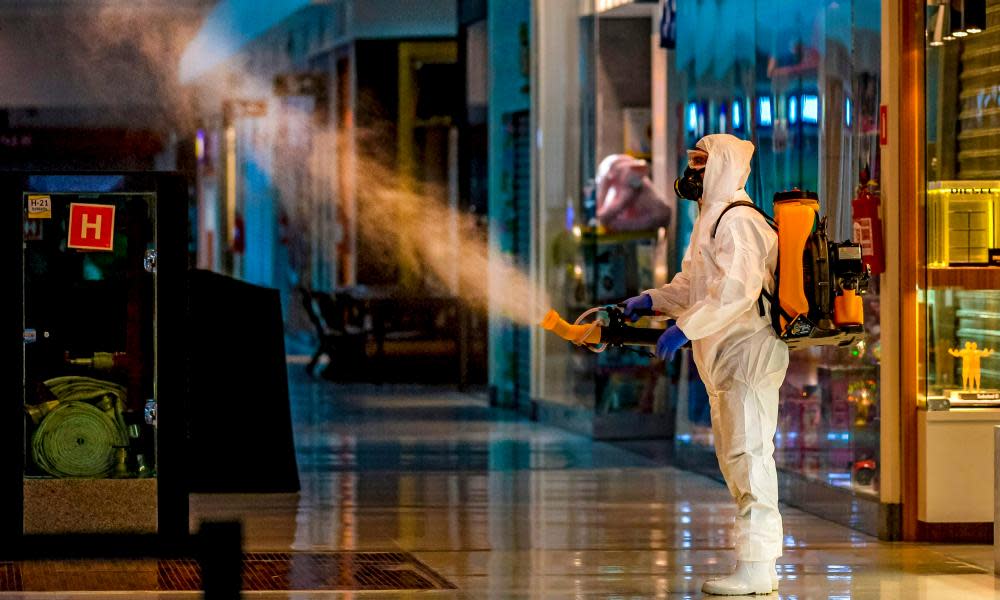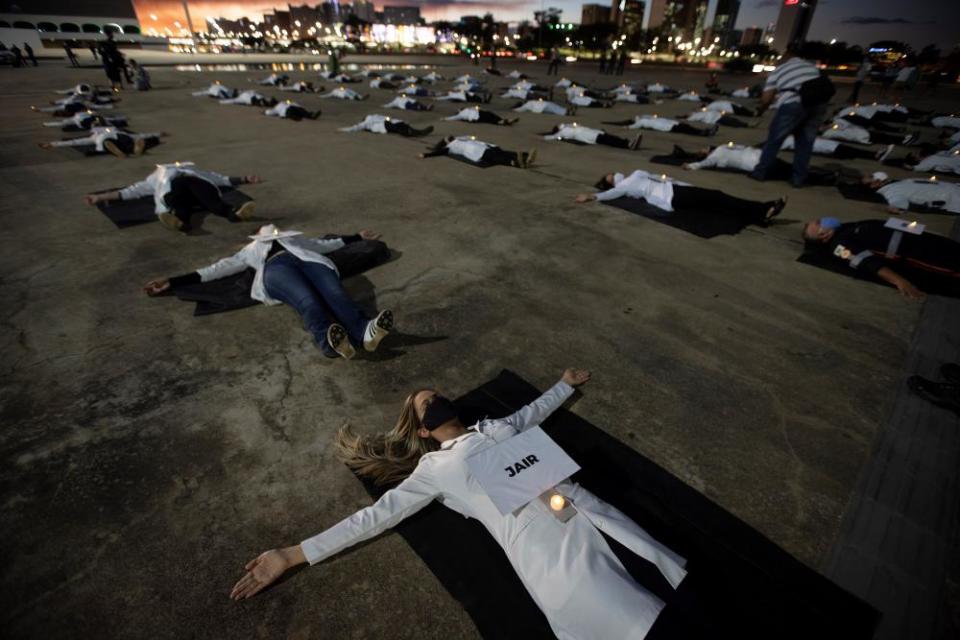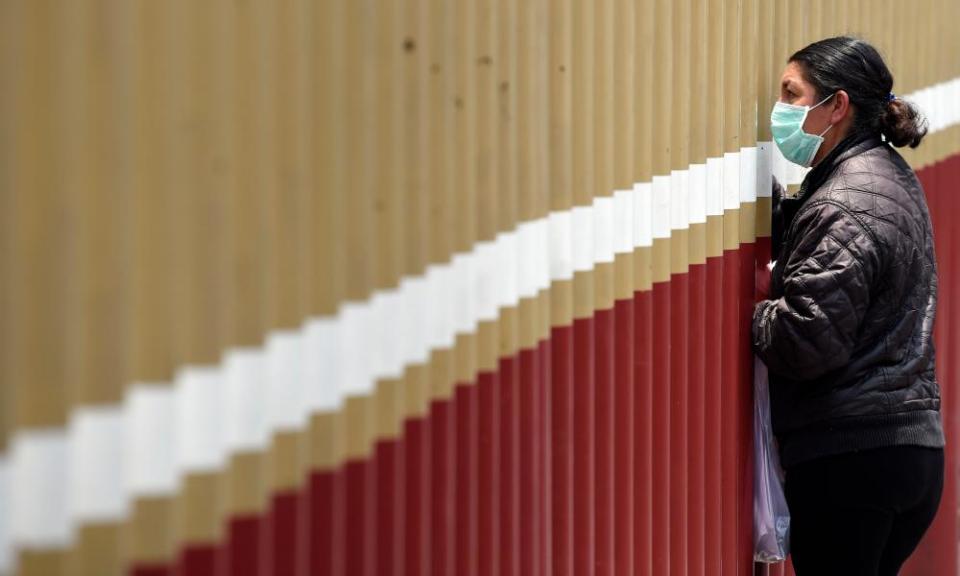Record death tolls in Mexico and Brazil add to fears of Covid-19 surge in Latin America

Brazil and Mexico have logged their highest single-day coronavirus death tolls to date, raising fears the pandemic is surging across Latin America amid ambivalent and delayed reactions from the governments of its two most populous countries.
Related: 'Utter disaster': Manaus fills mass graves as Covid-19 hits the Amazon
In Brazil – where the president, Jair Bolsonaro, has dismissed the virus as “a little flu” – the health ministry reported a new grim record of 881 deaths in 24 hours on Tuesday night. It has now confirmed 12,461 deaths, the sixth-highest death toll in the world, and 178,214 cases.
Mexico also reached a new landmark on Tuesday night, reporting 353 new deaths over the previous 24 hours and 1,997 new confirmed cases.
A relatively low number of 108 deaths had been recorded on Monday, sparking hopes that the country was containing the spread because the daily toll had been falling since last week. But the figures from Tuesday renewed concerns about its response and took the number of confirmed cases to 38,324 with 3,926 deaths in total.
Bolsonaro, who has shrugged off the pandemic’s increasing death toll, did not comment on the new figures as nurses demonstrated in Brasília on Tuesday night for International Nurses Day.
On their backs, printed in black, were the names of 109 colleagues who have so far lost their lives to Covid-19. He did, however, tweet his congratulations to nurses “fighting on the frontline”.
Although Brazil is the worst-hit country in Latin America – and has the seventh-highest number of cases in the world – restrictions on movement have been imposed on just a handful of cities in a country of 211 million people.

While most of the country’s 27 governors have criticised Bolsonaro’s stance, none has imposed mandatory statewide lockdown measures recommended by experts. Instead, they have either applied selective lockdowns in cities or left mayors to make those decisions.
Alexandre Telles, the president of the state’s doctors union, Sinmed, accused the president of “totally irresponsible” behaviour over the pandemic.
“It is a posture that disrespects life and the Brazilian population,” he said. “I don’t see the curve of the disease reducing without us enforcing social distancing measures.”
Telles – who works at Rio’s overloaded Ronaldo Gazolla hospital, which specialises in Covid-19 cases – said that there were 1,300 patients in the city waiting for hospital beds, many in overcrowded health centres. Yet people are increasingly disobeying social distancing guidelines, either because they have to work or because Bolsonaro has told them to.
“Rio’s health system was not prepared for this pandemic, in spite of the warning signs,” Telles said. “We have had days without basic medicine to sedate patients.”
On Wednesday, a Brazilian supreme court judge ordered the release of Bolsonaro’s own coronavirus tests. The negative result backed up the president’s previous claim of a clean bill of health, but doubts lingered after it was revealed that the three tests also were carried out nearly two months ago – since then Bolsonaro has repeatedly flouted social distancing advice and mixed with crowds of supporters and ordinary Brazilians.
Mexico is also facing a rising death toll – and questions over its response to the pandemic as the government pushes to reopen the economy.
Investigations by the New York Times, the Wall Street Journal and El País have all suggested that the government of Andrés Manuel López Obrador is severely undercounting both cases and deaths.
But Mexico has been under pressure from US officials to open businesses – especially auto plants and export factories along its northern border.
On Wednesday, the Mexican president claimed victory, saying: “The safe-distancing campaign has brought us control – a flattening of the curve” as his government unveiled plans to relaunch its flagging economy.
Construction, mining and car manufacturing will be declared “essential” activities and resume operations on 18 May. On the same day, schools and businesses in areas with low Covid-19 case numbers – dubbed “municipalities of hope” – will start reopening with the rest of the country projected to reopen on 1 June.
“Let’s move toward this new mortality,” said Jorge Alcocer, the health secretary, before correcting himself: “New normality.”

The reopening comes amid persistent fears that its public health response – which has depended on a disease modeling rather than widespread testing – has failed to capture the scope of the crisis.
“They won’t recognize that they have deficiencies in their counting and the capture system [for health information] is deficient,” said Xavier Tello, a physician and healthcare consultant.
Analysts say Mexico’s Covid-19 statistics must be read with nuance since there is a lag in the reporting of health information: the nightly death toll does not necessarily reflect the number of deaths the previous day.
An analysis in the magazine Nexos also cautioned that simply reading the nightly Covid-19 numbers makes it hard to know if the curve is flattening.
But Dr Alejandro Macías, Mexico’s former flu commissioner, tweeted on Tuesday after the record death toll was announced: “It’s the largest number until now and shows the we are still on the increase … It’s likely we haven’t seen the worst. The United States, a country with three times the population, has already registered 20 times more deaths.”
Chile’s government announced plans for a compulsory quarantine for the 6.5 million inhabitants of its capital Santiago – the strictest measures for the country which until now had employed localised lockdowns.
The move came after new figures on Wednesday revealed that Chile had logged 2,660 new coronavirus cases in 24 hours – a 60% increase on the previous day’s figure.
The Associated Press contributed to this article

